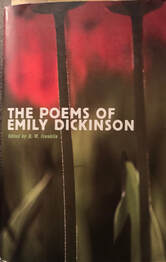|
Dr. John Getz from Xavier University is leading us on a tour of Harriet's "Literary Neighborhood"--authors and work that interacted with her own life and work, even though they were often geographically far apart. CLICK HERE for the full series.  Frustrated by physical distancing and having to stay home all the time? Try reading poems by someone who was an expert at both and actually enjoyed them: Emily Dickinson. See, for example, her poem “The Soul selects her own Society” (1862). As an adult, Dickinson rarely left her home in Amherst, MA, but she felt close to certain family members and friends. Without email and text messaging, she wrote them volumes of beautiful letters. Dickinson’s greatest act of communication, her “letter to the World/That never wrote to Me,” is her poetry. It’s an immense body of work, almost all of it unpublished in her lifetime. Dickinson’s world may seem narrow, but she read widely, and her poems reveal deep emotion and thought. The subjects are so varied that there’s probably a poem for whatever mood you’re in—from deep religious faith to terrible doubt, from joy in the beauty of nature to shock at its indifference, from supreme self-confidence to fear of going mad. Uncle Tom’s Cabin was one of the many books Dickinson read, and she wryly reported being scolded by her father for it. Critics have observed that Dickinson’s poem “One need not be a Chamber – to be Haunted –" seems based on the plight of superstitious, haunted Simon Legree late in Harriet’s book. Although Dickinson didn’t title her poems, you can find many of them free online if you search by their first lines, which serve today as their titles. Dickinson always invites a variety of reactions from readers. You may already be a fan—or not. If you aren’t sure how you feel about her work—or even if you are--try some of her poems. Then let us know what you think. Please share what you like or don’t like about Dickinson’s poetry or any of your observations or questions about it. About the author: Dr. John Getz, Professor Emeritus, Xavier University, retired in 2017 after teaching English there for 45 years. He specializes in American literature, especially nineteenth century, as well as the intersections of literature and peace studies. He has written articles on a variety of authors including Edith Wharton, Sherwood Anderson, and Ursula Le Guin. He appears in the documentary film Becoming Harriet Beecher Stowe, scheduled for release in spring 2020 by Fourth Wall Films.
0 Comments
Leave a Reply. |
Archives
March 2025
Categories
All
|
|

 RSS Feed
RSS Feed